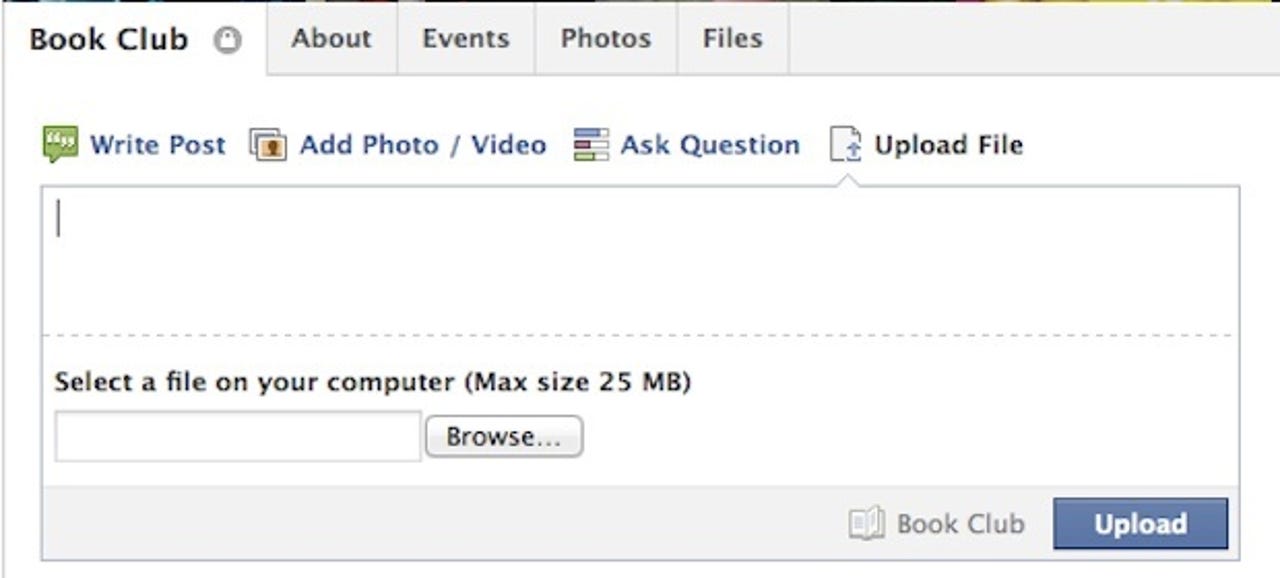File sharing coming to all Facebook Groups

Facebook is planning to bring file sharing to all Facebook Groups, allowing members to send files to each other. I have contacted Facebook to find out more and will update you if I hear back.
Update at 1:20 PM PST - "We started to roll out file sharing for all groups," a Facebook spokesperson said in a statement. "We previously launched it to Groups for Schools and now we're making that feature more widely available. It's only out to a small percentage right now, but we'll be rolling it out to all groups soon."
In the meantime, Mashable says the new feature is rolling out to a small percentage of Groups today, and will become available to the rest in the following days. In other words, it's a gradual rollout like all of Facebook's new features.
As you can see in the screenshot above, users can upload files up to 25MB in size. There are exceptions to what files you can upload: music files and executable files are not allowed. Facebook will be depending on its users to report illegally shared content on the site. To me, that's a potential recipe for disaster.
Last month, Facebook launched Groups for Schools, which talked about this feature. Here's what I wrote at the time: "Facebook says file sharing for these groups is coming, to make it even easier to share lecture notes, sports schedules, or class assignments." Now it looks like all Groups are getting the feature.
This reminds me of something else that came from Facebook co-founder and CEO Mark Zuckerberg: Wirehog. That's right, Zuckerberg worked on various other projects before he decided to build the world's largest social network.
Wirehog was a friend-to-friend file sharing program that allowed people to transfer files directly between computers. Wirehog was created by Andrew McCollum, Mark Zuckerberg, Adam D'Angelo, and Sean Parker in Palo Alto. They described it as "an HTTP file transfer system using dynamic DNS and NAT traversal to make your personal computer addressable, routable and easily accessible."
Launched in October 2004, Wirehog was only accessible via an invitation from a member. It was originally planned as an integrated feature of Facebook, but it could also be used by friends who weren't registered on Facebook. Facebook and Wirehog were integrated so that Wirehog knew who your Facebook friends were in order to make sure that only people in your network could see your files. Wirehog was written in Python and was available for Microsoft Windows and Mac OS X, with a promised Linux version that was never released.
Until at least July 2005, Facebook officially endorsed the p2p client on its website. The project was killed in January 2006. At least one of its uses on Facebook, namely sharing photos, has been superseded by the introduction of photo sharing on the social network itself. Facebook now sees more than 300 million photos uploaded to the social network each day. Wirehog, Myspace, Friendster, Picasa, Orkut, and others have all suffered as Facebook has become more and more dominant.
In my previous article, I wrote: "Facebook has launched a new Groups for Schools feature that brings the service back to its roots." I had no idea Zuckerberg was planning to go so far back to his roots to the days when he still wanted to sell Facebook.
See also:
- Here's what Facebook sends the cops in response to a subpoena
- Facebook Groups gain tabs, lose search box
- Facebook now shows members or a photo at the top of Groups
- Facebook launches university-exclusive Groups
- Google: Facebook is becoming "a closed walled garden"
- WinZip 16 lets you share files via Facebook
